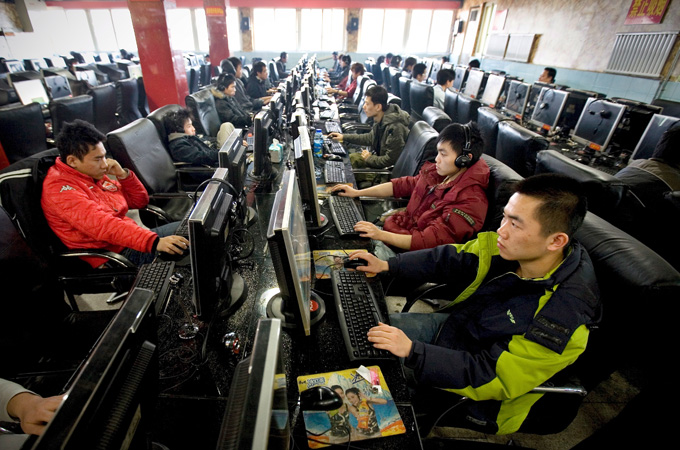China internet censored for Party Congress
Activists suggest online control intensified during key Communist Party meeting.

Shanghai, China – It was by design, certainly no accident, that the Chinese Communist Party 18th Congress went off without a hitch.
As in past decades, the Congress was a tightly controlled and scripted event.
Keep reading
list of 4 itemsCould shipping containers be the answer to Ghana’s housing crisis?
Are Chinese electric vehicles taking over the world?
First pig kidney in a human: Is this the future of transplants?
In Beijing, a ban was imposed on the sale of knives and toy airplanes, the latter apparently over fears that anti-government leaflets might be sent flying.
Taxi drivers were ordered to disable the back the windows of their vehicles, so passengers intending to spread subversive messages inside balloons and ping pong balls could not toss them out.
“Look for passengers who intend to spread messages by carrying balloons that bear slogans or ping-pong balls bearing reactionary messages,” read a notice to taxi drivers that was posted on microblog Sina Weibo.
But it was not just physical restrictions imposed. On the internet, there were developments that suggest Chinese authorities increased online censorship efforts to keep any dissent at bay.
|
“We don’t know exactly what is going on, but I don’t think it was a mistake because all Google websites were unblocked shortly after [the Congress ended].“ – Martin Johnson, GreatFire.Org |
Last week, Google’s transparency report – which gives information about the “flow of information” related to its tools and services – showed a sharp drop in traffic from China.
The China-based website GreatFire.org, which monitors the internet in the country, reported a number of Google websites, including the search engine and Google mail, were “DNS poisoned in China”. DNS stands for Domain Name System, the database that makes the internet work.
Founder of GreatFire.Org, Martin Johnson, a pseudonyn he uses to protect his identity, said the blocking of Google websites was “unprecedented”. Johnson believes the action was taken by Chinese censors.
“We don’t know exactly what is going on, but I don’t think it was a mistake because all Google websites were unblocked shortly after [the Congress ended]. Maybe they were afraid of the reactions to it or maybe they were just testing it,” said Johnson.
Google did not respond to a request for a comment, nor did key Chinese officials. In the past, however, officials have explained their committment to information control.
“While safeguarding a good internet market order, the improved management [of the internet] aims to stop the spread of harmful information online and clean cyber space,” Miao Wei, China’s minister for industry and information technology told a conference in September.
History of censorship
Many foreigners in China rely on programmes called virtual private networks (VPN) to circumnavigate what is popularly called the “Great Chinese Firewall” in order to access blocked websites.
In recent weeks, a number of companies that provide VPN services have reported interference and blocks in China. At least one VPN company linked these problems to the Congress in Beijing.
“These have been the most draconian few days of internet restrictions I have experienced,” Bill Bishop, an American living in China since 2005, wrote in a column in The New York Times on Monday.
Internet censorship in China is nothing new and many websites, including Facebook and Twitter, are permanently blocked.
With more than 500 million internet users, China has the largest online population in the world. But according to the independent watchdog Freedom House, the Chinese government:
“…maintains an elaborate apparatus for censoring and monitoring Internet and mobile-telephone communications. The authorities block websites or force deletion of content they deem politically threatening, and detain those who post such information.”
Johnson – a China-based American – said he believes if there was no censorship, the government, “would lose power”.
 |
| People using computers at a Beijing Internet cafe in 2009 [EPA] |
“They have been very good at censorship every since they came to power. It is one of the big constants,” he said.
Event-driven censorship
It is not unusual for internet censorship to increase around important political events or dates. Johnson said June 4, the anniversary of the Tiananmen Square massacre in 1989, is one such date.
“On Chinese websites, all the terms that could be connected with it are blocked. But then many of them are unblocked again as soon as the event is over,” Johnson said.
Rachel Lu, a founder and editor of TeaLeafNation.com, an emagazine that analyses Chinese social media, said the government:
“…wants to present a harmonious China at the time of these big political events. The Internet is a place of potential discord and inharmonous speech. Particularly with this 18th Congress because of the leadership transition and the speculation about the Politburo Standing Committee, they don’t want speculation on this.”
Two high-profile websites that have in recent months felt the wrath of Chinese internet censors are The New York Times and Bloomberg. The New York Times website was blocked last month after it published an investigation on the wealth of Chinese Premier Wen Jiabao’s family. Bloomberg’s website suffered a similar fate in June when it reported on the assets Xi Jinping’s family. Jingping was announced as the leader of the Communist Party on Thursday.
Social media usage in China has exploded with more than 200 million microblog users last year.
While the Chinese authorities like to use social media to guage public opinion, they also take steps to ensure any dissent or criticism are controlled. Posts on social media websites, such as the popular microblogging site Weibo, relating to sensitive topics are frequently deleted, said Lu.
Scaling the ‘Great Firewall’
Companies that run these sites are directed by the government and aid them in their censorship efforts by blocking certain search terms, deleting posts or shutting down discussions, she added.
“They see something that potentially might be of interest to the government and they delete it. And they collaborate with the government, if government censors want them to delete something they do,” said Lu.
But she doesn’t believe the companies are willing cooperators. “If they don’t do this, they wouldn’t be able to operate their platforms in China,” she said.
However, savvy social media users in China have found creative ways to discuss sensitive topics without alerting the censors. Often they will use similar sounding words to the those that are not allowed in order to freely discuss certain issues.
Many posts relating to the 18th Congress were deleted. To get around this, some Chinese netizens have replaced the Chinese phrase commonly used to refer to the Congress, Shiba da, with the similarly sounding word Sparta.
There was little indication during the leadership transition that the new leaders will loosen their grip on the Internet.
“All indications are that there are no plans to loosen up censorship online” Lu said. “I’m not optimistic that it will be different over the next few years.”